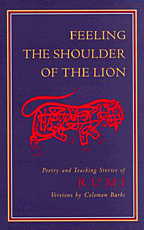The thirteen century Sufi mystic and poet Jelaluddin Rumi uses many metaphors to describe aspects of the spiritual journey. The lion is one of them. As translator Coleman Barks puts it, "In one poem [the image of the lion] represents time itself (see 'The Prophet's Vision'), but in most instances the lion is the point of necessity that comes at a certain moment, the fierce intensity that destroys ego-imprisonment, and opens one out into light and another field of being."
This collection of stories and poems focuses on the sober side of Rumi's work, rather than the ecstatic love poems that are usually associated with him. Here are instructions for achieving clarity, being disciplined, and achieving oneness. They come from the Mathnavi, the epic six-volume description of the spiritual journey to union with the Beloved.
In Islam, the lion is associated with Ali, the son-in-law of the Prophet. A famous story about him is retold here in "Ali in Battle." In the heat of a battle, Ali gains the best of a knight. The helpless man responds by spitting in Ali's face. At that point, Ali drops his sword and releases the man, explaining:
- "I am God's Lion, not the lion of passion.
The sun is my lord. I have no longing
except for the One.
When a wind of personal reaction comes,
I do not go along with it.
There are many winds full of anger,
and lust, and greed. They move the rubbish
around, but the solid mountains of our true nature
stays where it's always been.
There's nothing now
except the divine qualities.
Come through the opening into me.
Your impudence was better than any reverence,
because in this moment I am you and you are me.
I give you this opened heart as God gives gifts:
The poision of your spit has become
the honey of friendship."
